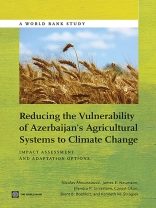Agriculture is one of the most climate-sensitive of all economic sectors. Azerbaijan is one of the many countries where the majority of the rural population depends on agriculture-directly or indirectly-for their livelihood. Further, changes in climate and their impacts on agricultural systems and rural economies are already evident throughout Europe and Central Asia. The risks associated with climate change therefore pose an immediate and fundamental problem in the country.Adaptation measures now in use in Azerbaijan, largely piecemeal efforts, will be insufficient to prevent impacts on agricultural production over the coming decades. As a result, there is growing interest at country and development partner levels to have a better understanding of the exposure, sensitivities, and impacts of climate change at the farm level, and to develop and prioritize adaptation measures to mitigate the adverse consequences. Beginning in 2009, the World Bank embarked on a program for selected Eastern Europe and Central Asian (ECA) client countries to enhance their ability to mainstream climate change adaptation into agricultural policies, programs, and investments. This multi-stage effort has included activities to raise awareness of the threat, analyze potential impacts and adaptation responses, and build capacity among client country stakeholders and ECA Bank staff with respect to climate change and the agricultural sector. This study, Reducing the Vulnerability of Azerbaijan’s Agricultural Systems to Climate Change, is the culmination of efforts by the Azerbaijani institutions and researchers, the World Bank, and a team of international experts to jointly undertake an analytical study to address potential impacts climate change may have on Azerbaijan’s agricultural sector, but, more importantly, to develop a list of prioritized measures to adapt to those impacts.Specifically, this study provides a menu of options for climate change adaptation in the agricultural and water resources sectors, along with specific recommended actions that are tailored to distinct agricultural regions within Azerbaijan. These recommendations reflect the results of three inter-related activities, conducted jointly by the expert team and local partners: 1) quantitative economic modeling of baseline conditions and the effects of certain adaptation options; 2) qualitative analysis conducted by the expert team of agronomists, crop modelers, and water resource experts; and 3) input from a series of participatory workshops for farmers in each of the agricultural regions. Reducing the Vulnerability of Azerbaijan’s Agricultural Systems to Climate Change is part of the World Bank Studies series. These papers are published to communicate the results of the Bank’s ongoing research and to stimulate public discussion. The study is one of three produced under the World Bank program "Reducing Vulnerability to Climate Change in European and Central Asian Agricultural Systems." The other countries included in this series are Armenia and Georgia. World Bank Studies are available individually or on standing order. This World Bank Studies series is also available online through the World Bank e-library (www.worldbank.org/elibrary).
Nicolas Ahouissoussi & Brent Boehlert
Reducing the Vulnerability of Azerbaijan’s Agricultural Systems to Climate Change [EPUB ebook]
Impact Assessment and Adaptation Options
Reducing the Vulnerability of Azerbaijan’s Agricultural Systems to Climate Change [EPUB ebook]
Impact Assessment and Adaptation Options
قم بشراء هذا الكتاب الإلكتروني واحصل على كتاب آخر مجانًا!
لغة الإنجليزية ● شكل EPUB ● ISBN 9781464801853 ● الناشر The World Bank ● نشرت 2014 ● للتحميل 3 مرات ● دقة EUR ● هوية شخصية 5894602 ● حماية النسخ Adobe DRM
يتطلب قارئ الكتاب الاليكتروني قادرة DRM












